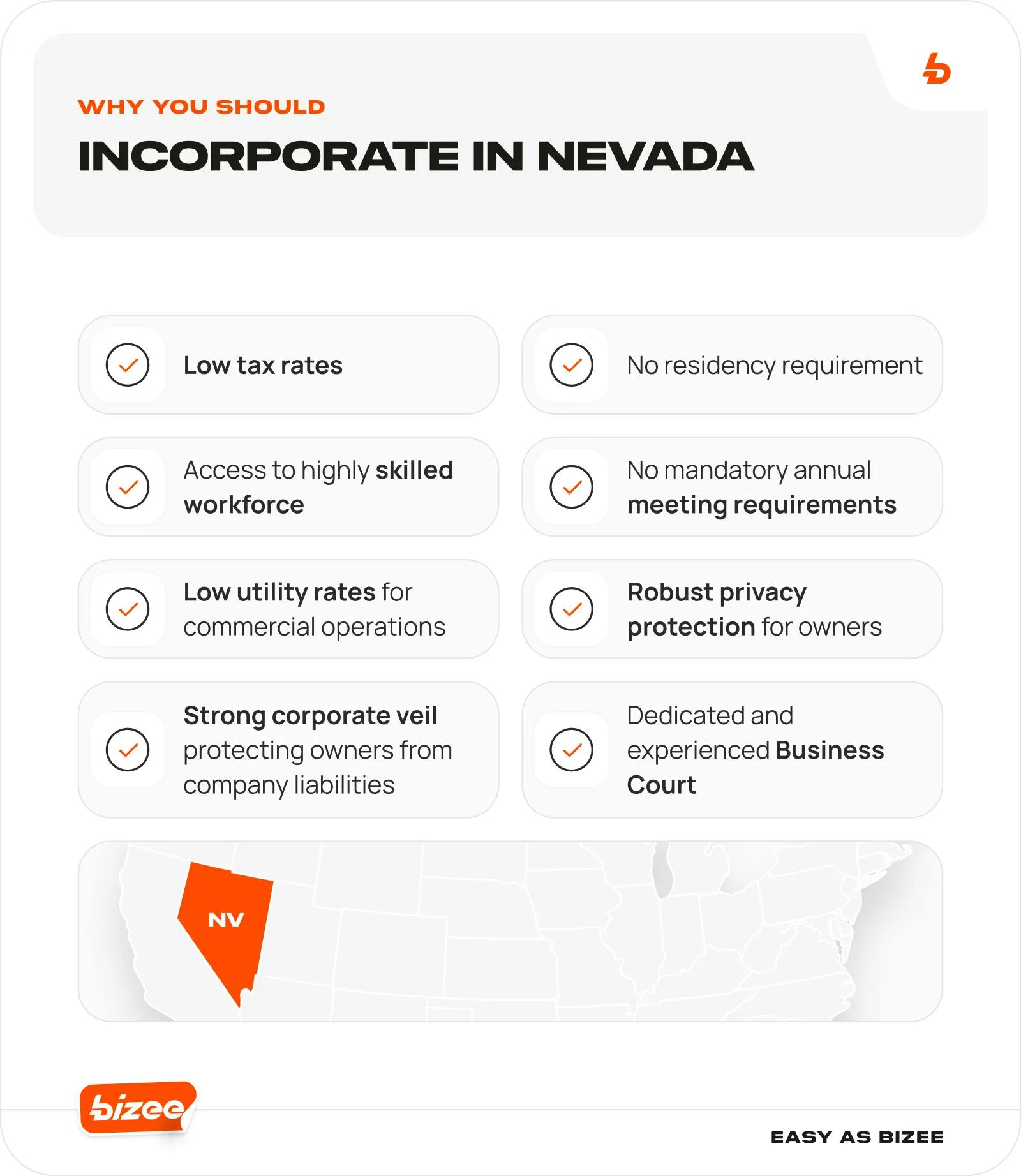Services
Services
Services
Services

Please note: This post contains affiliate links and we may receive a commission if you make a purchase using these links.
N o corporate income tax. No franchise tax. No tax on corporate shares. There’s a reason why more than 313,000 small business owners have chosen to incorporate in Nevada . These savvy entrepreneurs know how important it is to consider state fees, business climate, regulations, and tax structure. When it comes to your business's well-being, Nevada is an easy win.
Follow these steps and you’ll be well on your way to incorporating in Nevada:
Pick a unique business name that’s distinguishable, meets the state’s naming standards, and, most importantly, is available. Need to get the ball rolling? Try out these creative naming strategies . You can then search a name’s availability via Bizee’s Business Name Search Tool or Nevada’s Secretary of State’s Business Entity Search portal.
Expert Tip: This would also be a good time to run a domain name and social media username search. Having the same name across all channels will boost your branding .
Every Nevada business entity requires an in-state Registered Agent to receive all legal and tax documentation on the business's behalf. The Registered Agent needs to have a physical address in the state and must sign the Registered Agent Acceptance certificate in the formation documents. If you're considering listing yourself as a Registered Agent , be warned that it comes with certain risks and privacy concerns.
To incorporate an LLC, you must complete and file Articles of Organization. For corporations, you must complete and file Articles of Incorporation. Both of these forms can be filed online or sent via mail. You can pay the associated fee with a check or credit card.
An Initial List of Officers and Directors, plus a State Business License Application , has to be submitted alongside your incorporation documents. This applies to both corporations and LLCs.
The document checklist and filing fees for different business entities can be found below. For more detailed information on corporate filing requirements, refer to this Nevada Corp guide .
Documents & Fees Required:
Documents & Fees Required:
Documents & Fees Required:
While not mandated, it’s advisable to create an operating agreement for an LLC or corporation and to create corporate bylaws for a corporation. Corporate bylaws and operating agreements are internal documents that provide a framework for member duties, operations, communications, finances, dissolution, and conflict resolution.
For corporations, the bylaws should include provisions for the following:
Nevada requires all LLCs, corporations, and S Corps that sell taxable goods and services to register with the state. You can apply online via Nevada’s Department of Taxation website .
You would also need to get a federal tax number or EIN (Employer Identification Number) from the Internal Revenue Service (IRS) if you are a corporation, a multi-member LLC, or are planning to hire employees. Need an EIN? Use Bizee to secure your EIN and start doing business as an IRS-approved entity.
The bright lights and flashy casinos of Las Vegas might be the first thing you picture when thinking of Nevada, but there’s more to this state than the glitz and glamor. Nevada has a vibrant business community and is one of the top choices for businesses looking to relocate or expand.
Here are a few reasons you should pursue incorporation in Nevada.
The Tax Foundation rates Nevada as the seventh most tax-friendly state in the U.S., allowing you to take a significant amount of your money back home. Why is Nevada a tax haven? The state levies no tax on corporate income or shares. Furthermore, there is no personal income, annual franchise tax, inheritance tax, or inventory tax. This could be the reason why retail giant Amazon was attracted to Nevada. And let’s not forget that the Silver State has some of the lowest sales and property tax rates in the country.
Nevada also offers lucrative tax abatements on sales taxes for capital equipment purchases, personal property taxes, modified personal and business taxes, and employee training grants.

Nevada boasts some of the most business-friendly laws. The state legislature provides stringent liability protection for shareholders and owners. For instance, Nevada law doesn’t require you to pay back any undue debts or liabilities of the company. So, a creditor can’t be after your personal assets, like a car, house, or savings, to pay off the debts of the LLC or corporation. Shareholders and business owners are also not required to submit their list of assets to the state.
Additionally, shareholders and owners don't need to be residents of the state, and they have the ability to form an anonymous LLC . They have the final say on whether to buy, sell, hold, or transfer corporate stock.
The state has a dedicated business court that minimizes downtime and costs associated with litigation. You can be sure the process will be swift and a resolution will come quickly if you run into legal issues.
What truly stands out about Nevada are the supportive incentive programs offered by the state's government offices. The Governor’s Office of Economic Development has established Opportunity Zones and Emerging Small Business Programs to drive private investment and small business growth in local communities.
The Nevada Business Opportunity Fund and Nevada Small Business Development Center are two more government-backed resources that offer training and financial aid to new and expanding businesses. Battle Born Venture, the state’s venture capital program, is funded by the State Small Business Credit Initiative (SSBCI). Battle Born Venture provides business owners access to loans and growth accelerator programs.
It's safe to say that the startup scene in Nevada is booming — the state's business growth rate is almost double the country's average. Nevada also has an increasing number of minority-owned businesses, following a positive trend seen across the nation. Incorporating your business in Nevada would allow you to join a supportive community of like-minded entrepreneurs.
You can create connections for funding, share ideas and resources, and receive mentorship from entrepreneurship organizations such as the Las Vegas Urban League, the National Federation of Independent Business in Nevada, StartUpNV, and the Nevada Entrepreneur Network.
Nevada is the seventh largest state and its GDP is growing at 1.8%. Within the 50 states, Nevada's economic performance ranked 16th. Agriculture and forestry, arts and entertainment, manufacturing, healthcare, and finance and insurance are the fastest-growing industries. The state also leads the country in energy and clean tech innovation.
What do all these figures mean? As an aspiring business owner, it means that you can bring to life any idea across any industry and find success and support in Nevada.
Nevada is the fifth-fastest growing state in the U.S., and analysts estimate the population to grow by another 1.27% through 2023. These figures reveal an expanding customer base and access to a larger talent pool (if you do decide to hire down the line).
There are a few drawbacks to incorporating in Nevada:
Many states, including Nevada, often pass state-based laws that build on federal regulations or compensate for missed policies. These local laws can impact your business operations.
Here are a few state and local stipulations you should keep tabs on:
Each state and locality has its own sales tax system. Nevada’s state sales tax is 4.6%, but with the addition of city and county tax, it can be as high as 8.265%.
Whether you have to pay tax or not depends on your business's revenue amount, product, and industry. In Nevada, businesses that sell physical goods have to pay sales tax. This applies to e-commerce stores as well. Businesses providing a service such as consulting or freelancing are exempt from this tax.
If you want to track sales tax liabilities, read up on sales tax compliance literature, or use a bookkeeping and accounting tool .
Depending on the type of business, size, and location, state and local stipulations on licensing and permits can vary. To stay up-to-date on local licensing, permits, and certification requirements, check with the state’s licensing resource center and your local business office.
Applicable licenses may include a general business license, a professional license, a health permit, or an occupancy permit.
Not sure where to start your licensing research? Bizee’s easy-to-use Business License Research Package will remove all the hassle of identifying applicable licenses. We’ll also provide you with the latest forms and fees.
The Nevada Privacy of Information Collected on the Internet from Consumers Act (NPICICA) outlines the procedures a business must follow to protect its customers’ information. This law regulates the collection, storage, and usage of consumer information. Violation of these laws can lead to tarnished business reputation or fines. Stay informed on the state’s statutes by researching data privacy laws or consulting an attorney.
This is the most common state and local policy that’s increased in recent years and would affect any business looking to hire employees. Nevada’s minimum wage is $10.50, while the federal minimum wage is $7.25. As a small business, you must know what the state or local jurisdiction says about overtime pay and how many hours constitute a full day of work.
Incorporation costs in Nevada vary for LLCs and corporations.
For LLCs, the filing fee is $75. The Initial List of Members costs $150, and the state business license costs another $200. The total LLC filing fee comes to $425.
For corporations, the minimum filing fee is $75 but can be higher because it’s tied to the value of your stock. The Initial List of Members’ fee remains the same, while the business license fee is $500.
To find additional information on processing charges or expedited service fees, check out Nevada’s Secretary of State business formation fee list .
Delaware, alongside Nevada, is one of the most popular states for incorporation. According to Delaware's Annual Report statistics, 66% of Fortune 500 companies opt to form their business in Delaware. However, Nevada isn’t far behind.
Nevada has a lower tax burden compared to Delaware. Remember, Nevada is a tax haven — the state has no corporate, personal income, franchise, or annual tax. Delaware has a minimum franchise tax of $175 and an annual tax of $300.
The Silver State also has fewer compliance requirements. Nevada doesn’t require corporate bylaws, which are mandatory in Delaware.
Nevada offers some of the country’s best tax rates along with asset and liability protection, making it an excellent place to start your business. The ease of funding and the supportive, pro-business climate only adds icing to the cake.
No matter where you plan to file, Bizee can help you start with our $0 + state fee LLC. We've launched over 1 million businesses across all 50 states — now, it's time to launch yours right here in Nevada.

Swara Ahluwalia is a freelance content writer with experience in the technical, B2B and SaaS domain. She also has curated content for various lifestyle brands. In her downtime, you will most likely find Swara training for her next marathon or spending time with her two daughters. Read more


Get Bizee Podcast
Join us as we celebrate entrepreneurship and tackle the very real issues of failure, fear and the psychology of success. Each episode is an adventure.